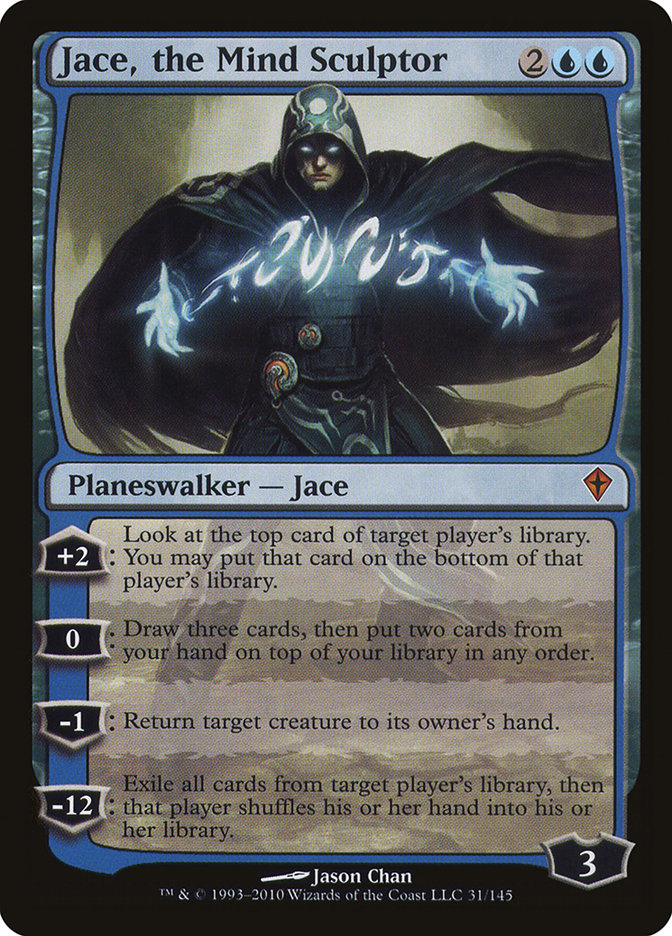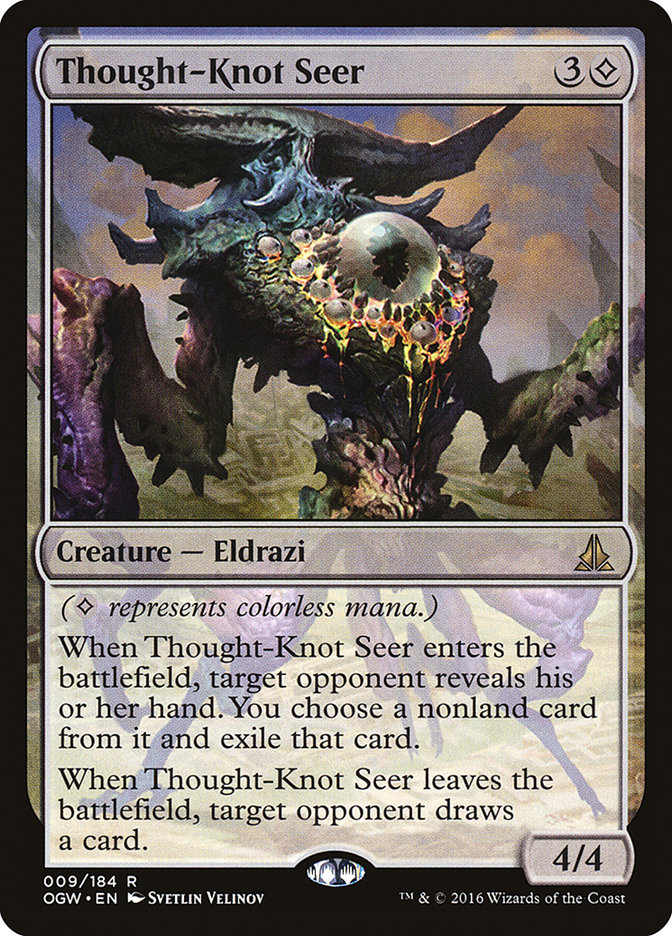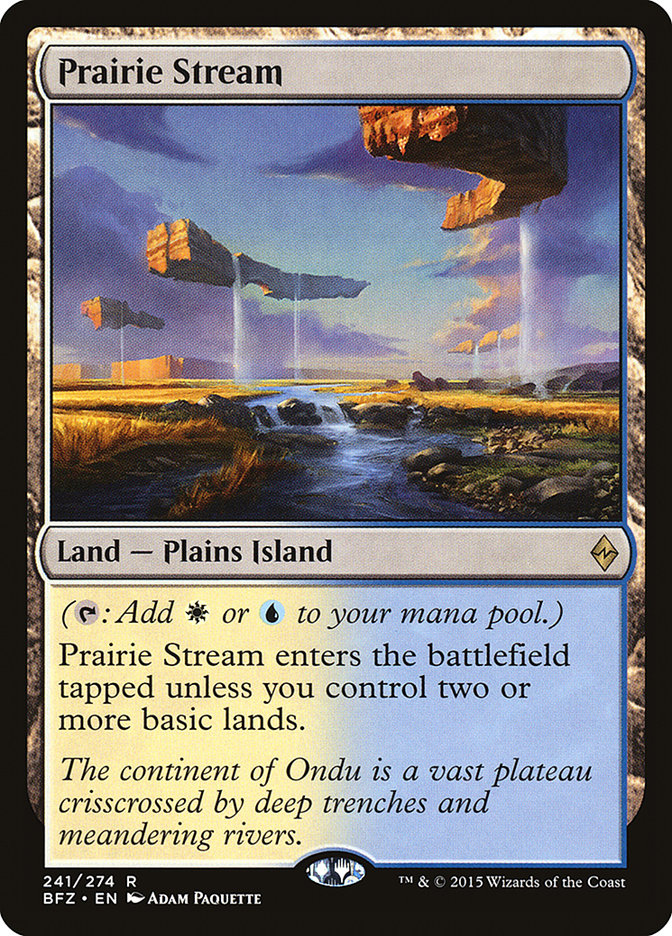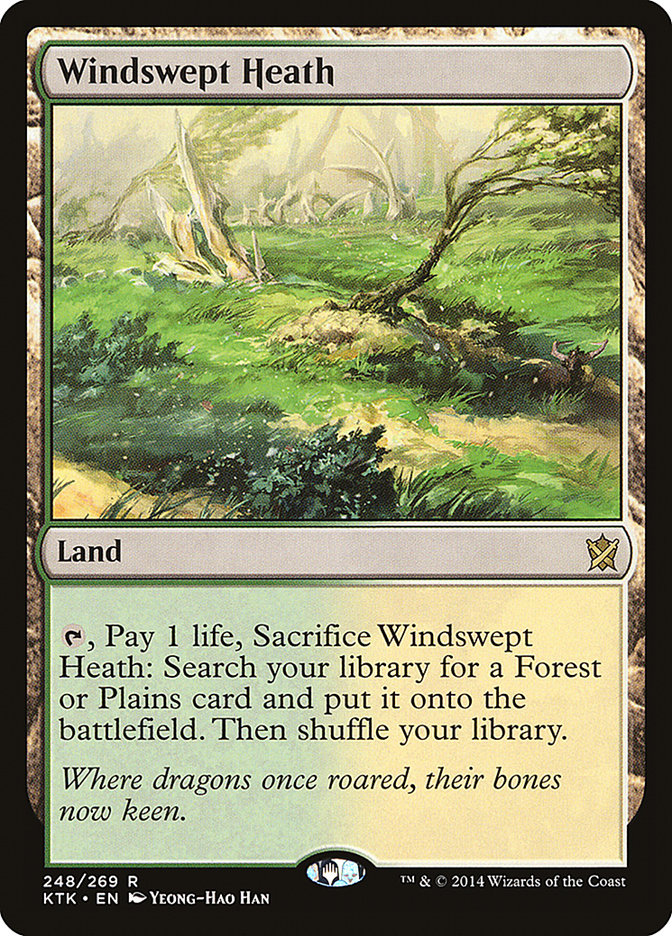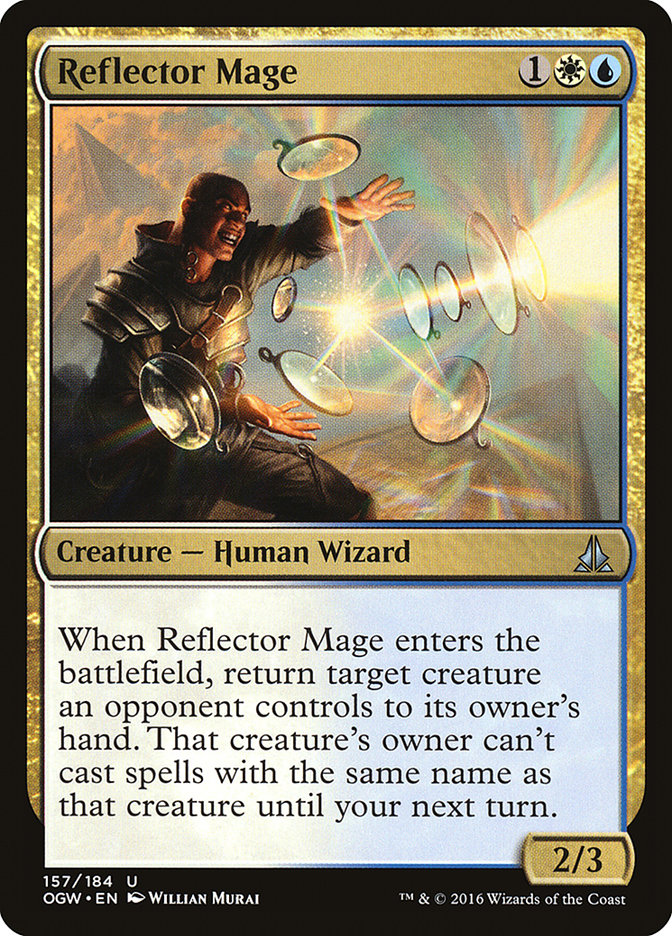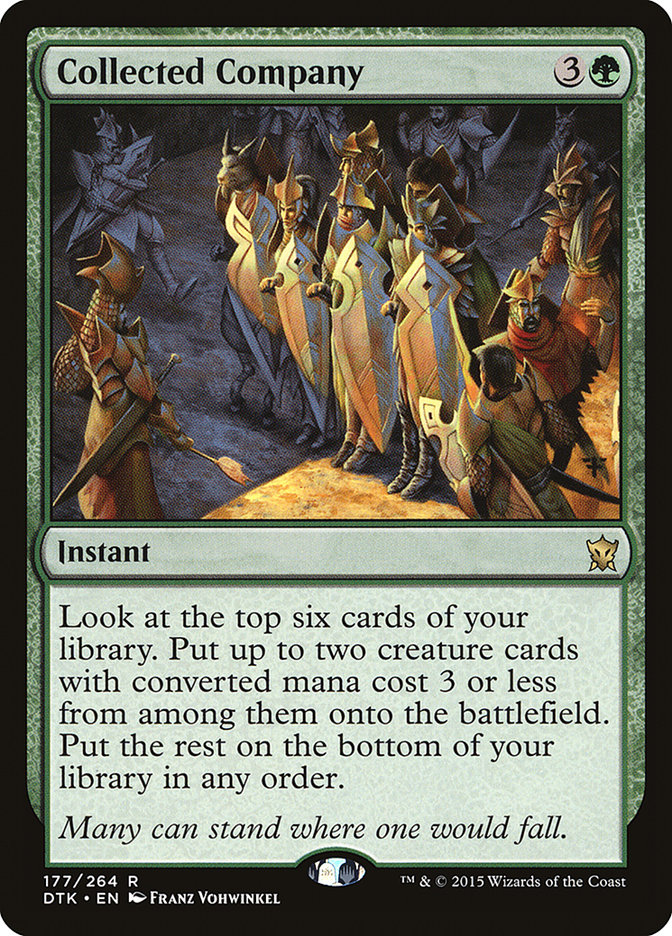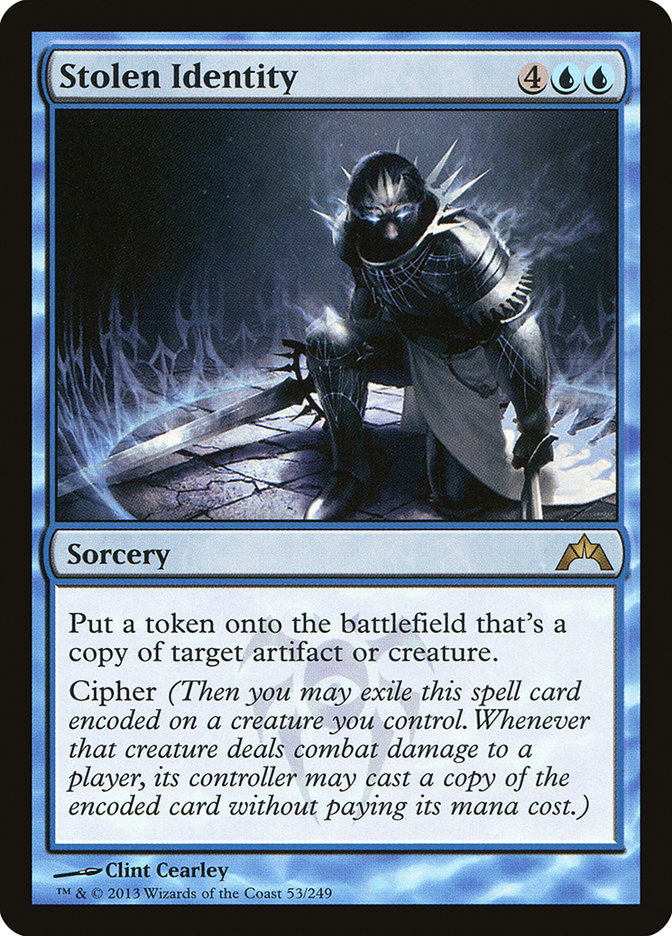 Rally. Some readers have noticed my list posted here. I only lost to G/R Ramp, and I thought my maindeck was great. Moving forward, I’d find room in the sideboard for better cards to bring in against ramp decks. I think that’s roughly what you needed to know about this weekend, so let me try something a little different.
Rally. Some readers have noticed my list posted here. I only lost to G/R Ramp, and I thought my maindeck was great. Moving forward, I’d find room in the sideboard for better cards to bring in against ramp decks. I think that’s roughly what you needed to know about this weekend, so let me try something a little different.
From time to time, writers will ask readers on social media to send them random questions and then answer a few of them in a “mailbag article.” Now, I don’t really mean to call anyone out. It can certainly come off as lazy, but that doesn’t mean it’s a bad system or that it produces bad articles. In fact, I’m actually more likely to read that kind of article than I am to read a more traditional strategy article, personally.
Today, I want to try my take on this, but it’s a little different. I haven’t asked people for questions to write an article, but recently I’ve been asked a few questions that had answers that I thought were particularly interesting, and I figured that now would be a good time to take a break from writing strategy articles about how busted Eldrazi in Modern and Reflector Mage in Standard are, to talk about a random assortment of things I think are worth reading about.
First, a little more about that.
I think this is the worst-developed block since, amusingly, probably Worldwake, the last time we were on Zendikar, though maybe it’s really just since Scars of Mirrodin block, which had a Sealed format dominated by six-mana rare cards that killed all of your opponent’s creatures and your opponent (Carnifex Demon, Sunblast Angel, Contagion Engine, and Hoard-Smelter Dragon), followed by New Phyrexia, which notably featured the egregious Phyrexian mana mechanic. Coincidentally, Scars was a return to Mirrodin, home of the last great development failure (Skullclamp and Affinity in general). That’s a bold claim, so why do I think it’s so bad, and isn’t Standard relatively diverse right now?
Battle for Zendikar Limited had terrible color balance, with green being far outside the normal range of power levels of colors in Limited, and generally had a problem where it was trying to support some aggressive strategies like R/G Landfall and W/R Allies that weren’t really possible because of how randomly good some of the defensive creatures were against them (notably Kozilek’s Sentinel).
I’m also going to call the Battle lands a failure of development. This isn’t even about how I generally think fetchland plus two-color land manabases mess with gameplay by making players wait through far too much shuffling; that’s true, but not necessarily a development failure specifically. However, if you’re going to put mana this good into Standard, you need to be completely sure you’ve tried pushing it as far as it can go and you know exactly what it’s capable of.
They simply didn’t. They didn’t find the Four-Color Rally the Ancestors deck that’s been played in Standard because they didn’t try pushing the mana far enough to figure out if it could work, and the result is that we have a Standard format dominated by graveyard interaction with minimal graveyard hate, leaving players feeling helpless where there need to be tools to attack an expected problem.
Oath of the Gatewatch broke Modern. I get that that’s not a huge concern of theirs, and they don’t necessarily regret printing cards like Treasure Cruise that are obviously too good for Modern, but this time it felt more intentional (because of putting Eldrazi Temple at uncommon in Modern Masters 2015).
More importantly, Reflector Mage. Not playing with a card that warps Standard this much is just unacceptable to me.
Okay, rant over. Let me get back to my intended topics.
Doing Good
In a recent interview, I was asked about how Magic has helped me in other areas, and I said Magic has helped me with absolutely everything in my life, and I think this is one of those “feel good about what you do” topics a lot of people would probably be interested in hearing more about.
Basically, I feel like this is an extension of the “everything I needed to know, I learned in kindergarten” mentality, but taken in a bit of a different direction. More broadly, this speaks to how I view education in general.
Magic has been my passion since I was eleven or twelve years old. Everything I’ve learned about the world since then has been learned as a Magic player. What does that mean? Well, I think that when someone is really into something and knows that thing really well, it becomes easiest to relate to anything new by analogy to the thing they know best. For me, everything is like something in Magic.
I once read that throughout history, people have compared the human brain to whatever the most advanced technology is. I have no idea how accurate that is, but it kind of applies here. People are really good at analogies, and finding patterns, and correlations, and whatever else; it’s all pretty similar. Whatever your thing is, you can find an analogy to most other things from it. I have a theory that being deeply versed in anything is good for people, because it lets them build deeper analogies that they have closer ties to. It doesn’t matter if it fits perfectly. It matters that it lets you strongly relate to it. I have no idea if this is true. It’s just a theory.
Anyway, they asked for some examples of what kinds of things Magic has helped me with. I said it’d be easier if they named literally any topic, and I’d tell them how Magic has helped me with that. So they asked how Magic had changed my values.
This was an interesting one that I could take in a few directions, but eventually I settled on a clear best answer. Magic taught me the utility of being a good person. Now, you shouldn’t need “being a good person” to have utility; you should strive to be a good person regardless of what you get out of it, because, I mean, that should be somewhat self-evident in the phrase “good person,” but, it can help to know that the good people really do get rewarded.
Magic is a huge network, and everyone is only a few degrees of separation away at best. Also, I’ve been at this a long time, and so have a ton of my peers, so I have ten- to twenty-year histories with a lot of players. The things you do matter, and people remember. Generosity counts, everything comes back around, and there’s really no way of knowing who is going to end up being a major player in your life a few years down the line.
When you take time to have a conversation or help someone out, it may be something trivial to you, just a random moment, an aside in a busy day, but you might say something that sticks with someone, and they’ll remember you. It shapes your future interactions with them, and also sometimes with other people who know them, because people really love to talk about other people.
I’ve always followed a strict code of ethics, but that’s not the best way to be a good person. See, the thing about a strict code is that, in codifying things, it tends to identify all the moral obligations without assigning proper weight to additional praiseworthy actions. Basically, following a code as a way of being a good person is just doing the bare minimum to not be a bad person. “Do no harm” is a fine starting point, but it doesn’t take you very far.
The problem is that I’ve always loved games, even before I learned Magic, and as a gamer, it’s easy to view life as a competition, where the goal is to do the best you can within the rules, so thinking about things in terms of maximizing personal utility while following rules just made sense. I needed Magic as a community to show me how much it just makes sense to start from the position of just trying to do what’s best for everyone around you, not just yourself. Internalizing it has been a slow process, but it helps to get to really see how, even if you only value selfish ends, selfishness isn’t the best way to achieve them.
Relatedly, in many ways, being a good person is an expression of or general act of privilege. This isn’t to say privileged people are better people, but to acknowledge that it’s a lot easier to be generous when you have more than you need. If you’re burdened by enough personal difficulties that it can be hard to put time into other people, that’s forgivable, but it can be liberating to recognize that you can view it as an investment in the future, and take comfort in knowing that if you make time for it, there’s a good chance that it’ll pay off down the line.
Now, if you’re really struggling, you’re not looking for investments in the future, especially not high-risk investments, regardless of how much positive long-term equity they come with, but it’s just something to try to watch out for. Also, it helps to recognize how much easier it is to be a “good person” when you have advantages, and not to hold it against people who don’t when they don’t do things that seem clearly right to you. Maybe allow yourself to take pleasure in doing good as an expression of power; it’s okay to feel a little smug about it, you’ve earned it, as long as it’s actually encouraging you to act better to do so.
I’ve opened up a lot of cans of worms here with regard to the extent to which someone is a good person if they help others out of self-interest. My take is that it’s not so important why you do what you do–I think I’m Aristotelian in that way–to lift a quote from Google:
“Excellence #2. “We are what we repeatedly do… excellence, therefore, isn’t just an act, but a habit and life isn’t just a series of events, but an ongoing process of self-definition.” ~ Adapted from Aristotle.”
I think I’ve also heard this quote with the word “virtue” replacing “excellence.” The point is, ultimately, your actions are what matter, and repeatedly doing the right things forms habits to do the right things, and the original reason or motivation fades away, and what’s left is that you are what you’ve been.
Inclusive Language
Next, while we’re on the topic of doing good, I want to discuss inclusive language, as I recently engaged in a bit of a twitter exchange with Paulo Vitor Damo Da Rosa:
To my female followers only – does the use of the term “manland” bother you? Do you prefer “creature land”?
— Paulo Vitor (@PVDDR) February 22, 2016
I replied that this question misses the point, and then we had a long exchange where the constraints of Twitter made getting my point across somewhat challenging, but eventually we got here:
@SamuelHBlack @thedoh so you’re saying using “man” does systemic damage that goes beyond anyone’s individual feelings?
— Paulo Vitor (@PVDDR) February 22, 2016
I see a lot of people react in a way that is rooted in the same confusion Paulo had here. When confronted with a change to inclusive language, people complain that they can’t believe people are so soft that they’d be offended by people calling a card in a game a “manland” instead of “creature-land.” As I said to Paulo, this completely misses the point. We don’t move away from the term “manland” because people started taking offense or expressing that offense. Once you’re used to it, it’s probably not offensive. In some ways, that fact itself is the problem. Ben Yu summarized pretty succinctly:
@PVDDR It’s when you have lots of terms – “mankind,” “hey guys/dudes,” “businessman,” always using “his” – that permeate your language…
— Ben Yu (@professorben) February 23, 2016
@PVDDR that I can see a how a little girl can subtly take the hint that “this is not for me”
— Ben Yu (@professorben) February 23, 2016
I generally believe that subtle things people pick up subconsciously from language are tremendously important in shaping the world. This is why I’m firmly on the side of careful language and view “political correctness” as positive and valuable.
On a somewhat related note, because I’ve written about my partner, Lex, who’s agender/nonbinary and prefers the gender neutral singular pronoun “they,” I was asked how I thought about the idea of changing the templating in Magic from “he or she” to they, so Thoughtseize would read, “Target player reveals their hand. You choose a nonland card from it. That player discards that card. You lose 2 life.” Or, maybe it would read, “Target player reveals their hand. You choose a nonland card from it. They discard that card. You lose 2 life.”
First of all, this saves several characters, allowing Wizards of the Coast to fit more text on cards, but that’s a small perk, not the real issue at hand.It’s not a question I’d thought about until I was asked, but it’s a change I strongly support.
Any respected publication using the singular they as a legitimate word supports the movement to accept and formalize singular they as a real part of English. This makes the language much better, as it allows people to smoothly discuss people of unknown or unspecified gender, but also makes life much easier for nonbinary people. Any efforts toward this end count as doing good in the world, and it’s in Wizards of the Coast’s interest to generally do good in the world for the exact same reason it’s in your interest to be a good person, as outlined above.
Further, “he or she” is currently used because it’s an attempt at inclusive language. The problem is that it’s a failed attempt. It might not fail very many people, but it fails them catastrophically.
Before Lex had fully identified and understood their own gender, they had a negative visceral reaction to reading “he or she”–like most others, they’d gotten used to “he” as a neutral term, and knew that everyone understood it to mean “everyone,” even though everyone knew that the word very much means “only a little under half the people.” The problem with “he or she” is that it goes out of its way to try to painstakingly remember everyone, and in doing so, it firmly denies the existence of anyone who doesn’t identify as he or she. This makes it more aggressively exclusive than any other phrasing.
This stuff matters, and I’ve seen it deeply hurt them when people who claim to know they exist and claim to be sympathetic to their cause still use and stand by “he or she.”
Magic uses “he or she” in an attempt to be inclusive and progressive, but progressive society has progressed to the point where it’s outdated, regressive, and exclusionary, and Magic would be well served as a brand by being at the front of a change that I think will be widespread in the near future, as we already see much larger companies like Facebook extensively using.
I’ve heard a counter argument that there’s a lot of value to including the words “she” and “her” on Magic cards, as a way to explicitly tell women they’re welcome in a hobby that they can feel rejected from. I’m sympathetic to that, but I think using “they” is still unusual enough that it calls attention to itself in a way that says “this is not just he,” and that that can capture some of that value. Moreover, I think the good done by using “they” here is great enough that leaning on writing “she” on cards to call out to women to try to fix Magic’s gender problem is the wrong way to go. It’s a costly crutch, and one that I think ultimately does harm as Magic’s style guide starts looking increasingly backwards.
Playmat Matters
Lastly, totally changing gears, I want to talk about a question a couple of young players asked me just before I left Louisville. They asked me why pros don’t use playmats. In case you haven’t noticed, yes, that’s a real thing.
If you look around at a Grand Prix, it’s not uncommon to see every single player using a playmat, except players with pro levels. There may be exceptions on both sides, but the trends are strong.
I’ve been asked about this before, but usually, people just ask why I don’t use a playmat. I usually answer that I just don’t like carrying things around, which was the real reason for a long time. For most of my magic career, I’ve showed up with just a deck–no backpack, no dice, no paper, no binder, no playmat, no water bottle or food or whatever people generally carry. I’ve never liked wearing a backpack, and I found that carrying anything other than my deck just gave me a chance to forget and lose whatever else I had on me.
Recently, I’ve started carrying a satchel that has a lifepad-sized external pocket, some pen holders, some external dice pockets, and a pocket that holds a water bottle. I keep some food and things like extra sleeves in the main pocket. It’s pretty great, but I haven’t started carrying and using a playmat.
This time, they didn’t ask about me, they asked about pros in general. I’d usually try to blow them off, because the answer just isn’t something people talk about, but I wasn’t doing anything, and they seemed pretty intent on getting an answer, so I decided to tell them the truth of the matter, even if it’s a bit of a faux pas.
The truth has to do with the complexity of status signaling, which isn’t something people tend to talk about. See, at a low level, a playmat can be a status symbol. It shows investment and preparedness, if nothing else, but then other playmats can be earned, sometimes for doing well at events, and other times for showing up to large tournaments.
If you play at a local store with a lot of players who don’t play in larger tournaments, using a playmat that says it’s from a Grand Prix from a city in another state signals your investment in the game. It shows that you’re a serious enough player that you’ve traveled to play in tournaments. That can be something of a badge of honor.
The problem is that any time you choose to signal something that you’re proud of, you’re implicitly also signaling the fact that you’re proud of it. So, if the thing you have to brag about is having attended a Grand Prix, you’re implying that that’s still a significant accomplishment for you, meaning you’ve done no better than that.
When I was playing in PTQs in the early 2000s, the “PTQ Endbosses” sometimes had playmats that they’d attached lots of PTQ Top 8 pins to. In the context of a PTQ, those playmats were respectable status symbols and marked those players as some of the best players in the room. If those same players won one of those PTQs and brought that playmat to the PT, it would be out of place; it doesn’t make sense to brag about your PTQ Top 8s when everyone around you has at least won a PTQ, and many or most of them have accomplishments significant enough that making the Top 8 of a PTQ doesn’t appear on their list of notable finishes.
Now, you’re probably thinking this is ridiculous. For example, it might make sense that, at a certain point, it’s probably time to take those pins off your mat, but a playmat is a useful item and it’s not just a status symbol, so surely you can have one without it implying all this other stuff. Well, I can see how that would seem like it should be true. I’m just telling you how this stuff actually plays out.
It should be fairly obvious that this stuff is all relative to culture and trend. If you’re ever under the assumption that an opponent is at a certain skill based on their play accessories, you’re probably going to get losses you didn’t expect. Players use them because they like the art, they commemorate events, they were a gift–any number of things. Don’t take these observations as an indication playmats are somehow universally taboo. They aren’t. It’s just a leftover trend based on old play systems that have carried into the present because of players who are still on the Pro Tour today.
Beyond just the subtle status stuff, I’ve been in a house to test when players in the Hall of Fame who shall remain nameless somewhat extensively teased at least one other pro who shall remain nameless for using a playmat. This is to say there’s some amount of explicit grooming at the top that “this is not what we do.” Why? Honestly, I’m not sure how many people involved even know why.
Someone I was with overheard me answering this question, but didn’t hear the details, and asked me about it later. When I explained it to him, he said he’d never noticed or thought about it in those terms, but that he used to use a playmat, and at some point, he decided to stop. In hindsight, he realizes it was around the same time he decided he was “good,” and that he just subconsciously realized he wasn’t “supposed to “use one. I think that’s how it is for some players; they probably wouldn’t explain it, but they just realize that they “shouldn’t” use one. It’s amateurish. Why? Just because pros don’t do it.
Honestly, playmats are pretty great. They’re useful for claiming space in a crowded tournament and covering up gaps that sometimes form between adjacent table cloths. These days, there are so many playmat options that it can be like choosing an avatar, and gives you a bit of self expression, or a conversation piece to get to talk to your opponents. My friend and UltraPRO teammate Matt Severa uses a custom playmat he had made for his wedding, and it’s awesome, and I’d bet it makes him happy whenever he sets it on the table. Whenever I avoid embracing the “goobery” fantasy elements of Magic, Lex frowns and complains that too many competitive Magic players don’t like fun, or feel pressured not to admit that they’re into the flavor of the game–the stuff that drew them to the game as a kid may seem juvenile when we try to take it as a serious career, but playmats celebrate the fun elements of Magic, and recognizing the absurdity of the signaling involved in pointedly not using them, maybe it’s time we can get past that as a community.
And that concludes this installment of “Random Thoughts about Magic from Sam.” As always, this remains a strategy column on a strategy site, but I’m hoping that, in the dark times of the current state of Constructed, you enjoyed this departure from the usual fare.

